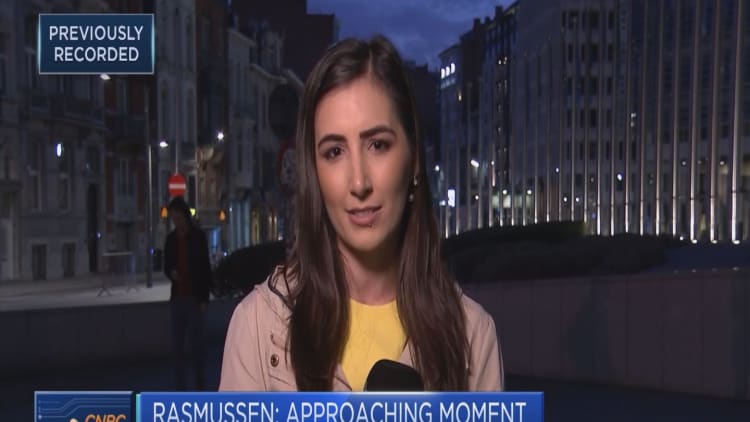European leaders are set to gather Wednesday afternoon in Brussels in what's seen as a key summit to understand the next steps in the Brexit process.
Brexit negotiators crushed high expectations that a deal over the Irish backstop was imminent during the weekend. Technical teams seemed to have reached a deal, but a meeting between the two chief negotiators, Michel Barnier and Dominic Raab, on Sunday evening ended up without any agreement over the Irish issue — postponing any real progress over Brexit and increasing the chances of a no-deal scenario. CNBC looks at the next steps in the process:
What happens now?
EU leaders will hear from Prime Minister Theresa May Wednesday and then decide what to do next. If they believe that there's been enough progress and they are close to a deal, the heads of state could call an emergency meeting in November to sign-off the Withdrawal Agreement.
However, because there is no agreement between the U.K. and the EU over how to solve the Irish question, the most likely scenario is that negotiations will continue over the coming weeks.
If in that time, a solution is found for the Irish border, the leaders could call for a summit.

Why did talks hit a deadlock?
It's because both sides want to prevent a hard border between Northern Ireland and the Republic of Ireland. The former is part of the U.K. and the latter is a member of the EU. It's also the only land border that the U.K. will have with the EU after Brexit.
The U.K. government's plan is to leave the EU's single market and its customs union, meaning there could be extra checks on goods moving from the EU to the U.K. and vice-versa. This poses the question of where the checks will take place.
The EU proposed that the checks happen at the Irish Sea and are carried out in the least intrusive way possible. However, the DUP (Democratic Unionist Party), the Northern Irish party that supports Prime Minister Theresa May in parliament, does not believe the EU's solution is a good one. The DUP argues that it divides Northern Ireland from the rest of the U.K. and forces Belfast to follow EU rules.

May has proposed to have a customs union with the EU, temporarily. But the EU rejected her idea. The 27 EU countries want a permanent solution that will always avoid a hard border between Northern Ireland and the Republic of Ireland. May's proposal was also not well-received by her party members. Some of them believe that a customs union with the EU, even if temporary, will restrict the U.K.'s ability to strike new trade deals.
Daniel Hannan, member of the Conservative Party at the European Parliament, told CNBC's Willem Marx on Wednesday that: "Staying in the customs union wouldn't just mean no Brexit, it would be something much worse than that."
"If you are in the customs union, basically you are in the EU's trade and tariff regime, what that means is that you are giving Brussels 100 percent control of your trade policy with zero percent input," he said.
Extending the transition period?
The EU's chief negotiator, Michel Barnier, is reportedly open to extending the transition period. Both sides have said that there should be a period of 21 months, until 2020, that will allow businesses and citizens to prepare for the U.K.'s departure from the EU. Extending that period could help the EU and the U.K. reaching a trade deal and thus avoiding using the Irish backstop that is currently dividing both sides.
However, U.K. lawmakers might not enjoy that idea either, because during the transition, the U.K. does not have any voting rights in EU policy and is still forced to comply with European rules. This would questions the U.K.'s sovereignty position — a crucial aspect for Brexiteers.

"I'm not surprised people are already talking about an extension to the transition period. I'm slightly surprised that they are talking about an extension before we actually conclude the negotiations on the Withdrawal Agreement," Seb Dance, member of the European Parliament for the Labour Party, told CNBC's Willem Marx.
Dance also said that the U.K. needs "to stop having a circular conversation" and engage with the EU. However, he also said that he wonders how much of the ongoing impasse is "theatrics."
Why does it matter that there is no agreement yet?
The U.K. is due to leave the EU on March 29, 2019. With about five months to go, time is running out before the U.K. and the EU solve their outstanding differences and ratify the exit agreement in their own parliaments.
The ratification process could prove complicated if May does not have majority in parliament to get it approved.
Without approval for the Withdrawal Agreement, the U.K. could leave the EU abruptly in March, bringing uncertainty for businesses, investors and consumers on both sides.



